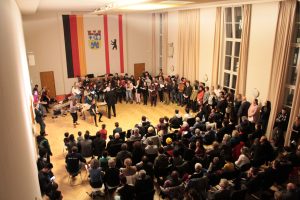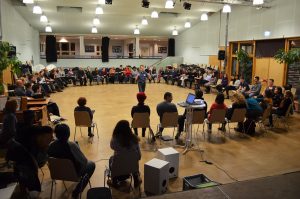“Singen, nicht hassen – الغناء، لا أكره – Let’s sing, not hate”
Berlin’s “Begegnungschor” brings refugees and locals together to overcome fear
Part 1 – Thomas Lloyd
It all started when I heard a story on National Public Radio’s Weekend Edition on December 20, 2015 about an unusual choir in Berlin that was made up of equal numbers of German singers and refugees from the wars in the Middle East. Called the ‘Begegnungschor’ (roughly translated as the “getting-to-meet-you” choir), they sang songs from each other’s traditions, working hard to learn both the language and style of unfamiliar music as an opportunity to overcome the isolation and prejudice the refugees face every day.
We were able to make contact with Susanne Kappe, one of the founders and recent president of the Begegnungschor, who was very cordial in her response to this unexpected inquiry from an American college choir. Her choir is a community choir of volunteers coming from all over Berlin. They were focused on just planning week-to-week, not a year in advance. Their overriding priority was to develop genuine comradery and trust between the German singers and the refugee singers on as equal a basis as possible. Any German singer applying to join the choir had to bring along a refugee singer to join with them at the same time.
After consulting with founding music director Bastian Holze, Susanne emailed copies of some of their German and Syrian songs to us. It was a fascinating combination of iconic German songs arranged to be sung in a variety of Western and Eastern styles (such as ‘Die Gedanken sind frei’ (Thoughts are free) and songs by the popular Arabic singer Fairouz (such as ‘Nassam Alayna nel-hawa’ (The breeze blew upon us). In turn, the Begegnungschor wanted to learn a simple arrangement of the African-American Spiritual ‘Swing low, sweet chariot.’
We were able to learn the Arabic pronunciation and style with help from internationally beloved violinist Hanna Khuri, based in Philadelphia with the ground-breaking Al Bustan Seeds of Culture program. We also brought along a special arrangement I composed for the trip, a ‘conversation’ between a Mahler folksong in German and an Al-Khalil song in Arabic, connected by the solo violin part common to both. We were thrilled when both the Germans and Syrians in our Berlin audiences sang along with their respective songs.
Mid-week we had our first rehearsal with the Begegnungschor. The Berlin singers came from work across all parts of the city. Bastian got us started with physical ice-breakers of elbow-bumps and knee-bumps accompanied by vocal sounds. He then led us in some whimsical vocal improvisation designed to get everyone singing right away without inhibition or judgement. Our students found the ease and enthusiasm of the Begegnungschor to be both energizing and infectious. Bastian then launched into a rehearsal that was both intensive and relaxed. After rehearsal, we shared soda and snacks together in an adjoining room, conversing in at least five different languages across the tables.
The concert itself was held in a huge, old city hall building that had been repurposed into a refugee center (the Arbeiter-Samariter-Bund Notunterkunft im ehemaligen Rathaus Wilmersdorf (ASB Emergency Accommodation for Refugees in the former Wilmersdorf City Hall)). Several members of the choir lived there, and told us of living conditions that were welcome but challenging; crowded rooms, limited heating, common bathrooms, and no cooking allowed. To draw as many residents as we could to the concert, we went downstairs to sing ‘Nassam’ in the large lobby, where sound could carry throughout the building. Many children came out to listen and followed us back upstairs to the concert with their parents.
Bryn Mawr senior Emily Drummond reflected later, “Singing in the refugee center was one of the most incredible experiences of my life. I remember standing in the courtyard of Berlin’s old city hall, and hearing the sounds of life coming from every window — babies crying, children playing, people chatting — like someone had squeezed an entire city into one building. As we sang an Arabic song in the entrance hall, people drifted toward us and sang along. We weren’t just performing for them — we were joining them, learning their music, seeing how they lived. I can imagine that refugees spend a lot of time learning how others live and trying to assimilate, so it felt appropriate that we were doing the same for them.”
For videos, photos, narrative, and more reflections about the collaboration go to: https://www.thomaslloydmusic.com/new-page
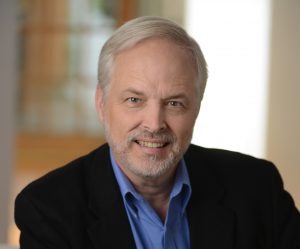 Thomas Lloyd lives in Philadelphia, where he is Professor of Music at Haverford College, Artistic Director of the Bucks County Choral Society, and Director of Music for the Philadelphia Episcopal Cathedral. He has led university and community choirs on eleven international tours to Latin America, Africa, the Middle East, and Europe, all involving collaborative performances with local choirs and shared repertoire. Also active as a composer, the premier recording by Donald Nally and The Crossing of his choral-theater work Bonhoeffer was nominated for a 2017 Grammy Award. See www.thomaslloydmusic.com for more information. Email: tlloyd@haverford.edu
Thomas Lloyd lives in Philadelphia, where he is Professor of Music at Haverford College, Artistic Director of the Bucks County Choral Society, and Director of Music for the Philadelphia Episcopal Cathedral. He has led university and community choirs on eleven international tours to Latin America, Africa, the Middle East, and Europe, all involving collaborative performances with local choirs and shared repertoire. Also active as a composer, the premier recording by Donald Nally and The Crossing of his choral-theater work Bonhoeffer was nominated for a 2017 Grammy Award. See www.thomaslloydmusic.com for more information. Email: tlloyd@haverford.edu
Part 2 – Susanne Kappe
The Begegnungschor is a choir in Berlin that began in October 2015. The idea to bring together refugees and Berliners in one shared choir was closely linked to the events and atmosphere in Berlin during that year. It was a time when the numbers of refugees arriving in Germany reached new record highs every month while at the same time demonstrations of the rightist populist movement Pegida and its offshoots stirred up opinion against immigrants, refugees and Muslims. In Berlin, a wave of support for refugees and an extraordinary level of volunteer commitment countered these ideas and the civil society stepped in when the government turned out to be incapable of caring for the many refugees in need of support.
At that time the community leadership association Leadership Berlin and the Berlin Choir Association (Chorverband Berlin) came together with the music directors Bastian Holze and Michael Betzner-Brandt and with the organizational support of Lydia Griese decided to combine their respective expertise and contribute to the integration of refugees into society by founding a choir.
The core of the idea was what became the name of the choir: the concept of ‘Begegnung’ – that newcomers and those who have always lived in Germany meet and get to know each other despite barriers of language or different cultures. A key element from the start was the idea of ‘tandem partners’, i.e. newcomers and Berliners pairing off as partners who not only come to rehearsals together, but have a close relationship that includes support in administrational issues, finding German courses, apartments, internships, jobs, and of course, friendship. Furthermore, the tandem concept was also a tool for keeping the proportion of refugees and Berliners in the choir in balance, as there has always been an overwhelming interest by Germans in joining the choir.
The choir indeed was a success from the start, which was primarily because the music directors were able to find ways to encourage everyone to sing and interact with the others even when it was in a foreign language and in a style of music they had never heard before. Most of our singers, both the refugees and the Germans, had never sung in a choir before. Through well designed warm-ups, easy-to-grasp songs, and the openness to include input from the diverse singers spontaneously into the process, they created a space where the spirit of music truly shaped a community.
This experience of Germans and refugees sharing music, learning from each other, and giving support is so enriching, that it is our hope to share it with as many people as we can and to spread the message of living together in friendship in an open and diverse German society.
We are glad that this message was also heard in the US and we had the opportunity to meet the Chamber Singers of Haverford and Bryn Mawr with their director Thomas Lloyd when they visited us for a shared rehearsals and a concert in a refugee shelter in Berlin. For us, this meant enriching ourselves with friends and music of yet another different culture, and sharing our way of overcoming differences by singing together.
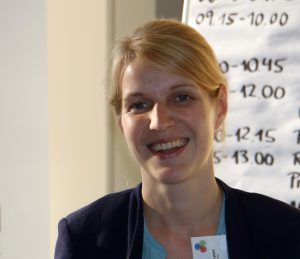 Susanne Kappe is one of the founders of the Begegnungschor in Berlin. She is the program coordinator at the community leadership organization Leadership Berlin – Netzwerk Verantwortung as well as the project officer for ‘meet2respect’, in which rabbis and imams together speak out for mutual respect in schools. She holds an M.A. in Political Science and Middle Eastern Studies from the University of Heidelberg and has studied Arabic in Germany, Egypt and Jordan. Email: susanne.kappe@begegnungschor.com
Susanne Kappe is one of the founders of the Begegnungschor in Berlin. She is the program coordinator at the community leadership organization Leadership Berlin – Netzwerk Verantwortung as well as the project officer for ‘meet2respect’, in which rabbis and imams together speak out for mutual respect in schools. She holds an M.A. in Political Science and Middle Eastern Studies from the University of Heidelberg and has studied Arabic in Germany, Egypt and Jordan. Email: susanne.kappe@begegnungschor.com
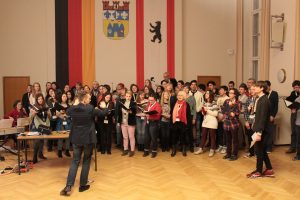
Part 3 – Abdulrahman Omaren
For me the “Begegnungschor” is a place where I come together with people to whom I relate very deeply. It is good to have someone who shares your interests – especially when you are lonely and far from your home and family.
The choir helped me to integrate into the society and to learn how easygoing and kind-hearted Germans actually are. And to see with how much vigor they commit themselves to an idea in which they truly believe. It is impossible for me here to name all my choir brothers and sisters (the ones who have been here for a long time as well as the ‘New-Berliners’ as they call us). But I do want to lift up these wonderful people; we have become a big family.
There is more that unites us than what divides us. Only love is capable of overcoming obstacles and making the impossible possible. By singing together we break the ice and overcome language barriers. We will continue to sing – today, tomorrow, everyday – and always together.
In January of this year, I entered our rehearsal room in Berlin and there were many visitors. They were our guests from USA, the American university chamber choir from Haverford and Bryn Mawr Colleges. It was nice to see and share singing with all these people. It was the first time for me to hear the song ‘Swing Low Sweet Chariot.’ I knew its story when our guest Tom Lloyd, the leader of the American choir shared it with us.
We shared an amazing performance with the Chamber Singers of Haverford and Bryn Mawr. They were very open to us, and smiling as we smiled back all the same. I think the secret in singing is that it make the facial muscles smile, who knows? We rehearsed together, and practiced each other’s songs. Singing together in the presence of an audience in the refugee camp was an special moment for both of us. Actually within few hours we were able to sing in harmony and in a concordant manner.
The audience seemed to very much like what we sang, too. What I loved most in this musical experience is the good feeling you get when you see people’s hearts opened and receptive to welcoming the others whom they didn’t know before. I would like to say to the members of chorus Chamber Singers of Haverford and Bryn Mawr what I could not say directly to them during their short visit to Berlin: that all the new/old Berliners and I were very happy to sing with you, and very glad to meet you. We hope to meet again and sing together for love and for hope. My friends in American choir, please remember us always when you hear the ‘Ode an die Freude,’ ‘We want Peace,’ and ‘Bintish Shalabya’ songs; rehearse well for we could meet another time to sing together…who knows?
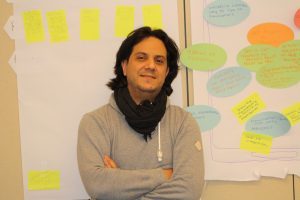 Abdulrahman Omaren is a Syrian journalist who was forced to leave his home country because of war. He has been living in Berlin since 2015 and has joined the Begegnungschor from the start. He writes poetry, stories, and tries to start his life anew. He has written articles for the German newspaper Tagesspiegel and the magazine Chrismon as a freelancer. He is currently enrolled at the German Protestant Journalism School (Evangelische Journalistenschule). Email: abdolrahman.omaren@gmail.com
Abdulrahman Omaren is a Syrian journalist who was forced to leave his home country because of war. He has been living in Berlin since 2015 and has joined the Begegnungschor from the start. He writes poetry, stories, and tries to start his life anew. He has written articles for the German newspaper Tagesspiegel and the magazine Chrismon as a freelancer. He is currently enrolled at the German Protestant Journalism School (Evangelische Journalistenschule). Email: abdolrahman.omaren@gmail.com
